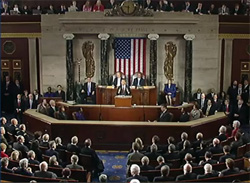 We are just under a month away and it is time to make sure that everyone, and I do mean everyone, in the United States of America is prepared, registered, and eager to vote in the upcoming presidential general election.
We are just under a month away and it is time to make sure that everyone, and I do mean everyone, in the United States of America is prepared, registered, and eager to vote in the upcoming presidential general election.
I would love to see Americans set a new standard this year for voter turnout. I would love to see the American people finally step up and show the world through their political actions that we are the premiere democracy we all hope and wish to be.
To this end I have whipped up this quick Top Ten Ways to Vote Responsibly in Politics checklist to make sure every eligible voter in America is registered and ready to make a responsible political vote come November 6th.
Top Ten Ways to Vote Responsibly in Politics
Number 1: Make sure you are Registered
With the voter fraud and ID laws that have been enacted in many states, many eligible voters have been purged from the system. Many of my friends and family who have been active in every election for years were removed, so don’t believe for a second you are immune to these voter purges. Make sure you are registered! Just Google “Register to vote [your state]” and pick the website that is a .gov.
Number 2: Make sure you have the Required ID(s) to Vote
Some of the voter fraud laws have restrictions that only those with certain types of ID or proof of identity can vote, even if you are registered. So be sure to have the correct ID ready and available. You should be able to find out this information when you verify your voter registration at your state’s website.
Number 3: Decide how you will Vote
In most states you have the ability to either vote in person at a polling place or to vote by mail. The preference is yours but I would suggest figuring out exactly what you are going to do so you are prepared come election day. If your state has been part of the new voter fraud laws you may want to vote by mail this year as the polling places are going to be stuffed and chaotic with many voters that will not be able to vote due to these new restrictions and laws. It might get really ugly. So to avoid these you may want to vote by mail this year. Or at the very least have a mail in ballot ready should your polling place be packed on Election Day.
Number 4: Know where you will Vote
It is important to find out ahead of time where your polling place is. Depending on the state you might have a very specific location where you have to vote or you might have the freedom to vote at any polling place in your district.
Even if you plan to vote by mail it is important for you to learn where these ballots have to be turned in should you need to turn it in at the last moment.
Number 5: Learn when you can Vote
This is also important as it can save you a headache come November 6th. Many states now offer early voting. This has really helped to alleviate Election Day woes of long lines and confusion at the polling places. Most early voting starts around a week ahead of Election Day, but your area may be different. Make sure you know so you can take advantage of it.
Employers are federally required to give their employees time to go vote. So don’t let your work schedule stop you from getting out there to vote!
Number 6: Learn about the Presidential Candidates
Make a point to go out and learn about all of the political candidates for president. Read through the top issues they are campaigning on figure out who best suits your ideals, values, and beliefs. Then please make a point to do some research on them. Don’t limit this research to just the websites, media outlets or talk shows that support your candidate. Also search for those that represent the other side as well as those that are try to be unbiased and neutral. You will never ever hear the truth from a single source so do yourself a favor, become broadly informed.
Number 7: Learn about which Representatives are up for Election
These are the politicians that are going to represent your political will at the national level. These are very important as they will have your state issues in mind. They will also follow their party line to some degree. This can be very tricky as often times these two things conflict politically. When it comes to your representatives look to how and what they voted for. On occasion you will have a representative that doesn’t yet have a voting record so you have to take their word on faith. This can be difficult.
Number 8: Learn about your Local Representatives
Local political representatives are often harder to learn about due to many are often running for office for the first time. Generally this is where many politicians start. If they like being a politician and are liked by the people they often move up to the state level.
However, these politicians are the ones you can easily go out and talk to. They will have town hall type meetings in the area. Will often respond directly to email or phone questions. This can make it more personal but also allows you to find out where they stand on issues directly.
You might have to do a little digging depending on where you live to get good information on them but most local newspapers do a great job of going through the candidates that in your area. So pick up your local papers special politics additions to get the bead on which local politicians you want to support.
Number 9: Learn about the Local and State Issues up for Vote
You should be able to learn about the local issues that are coming up for a vote through your local newspaper and their website. You should also receive a voter booklet to help you learn about the issues.
Often times these are the same issues you will hear about quite a bit leading up to the election. These are going to be votes to change the local budget, approve taxes for schools, constitutional amendments, and a myriad of other political issues. You may only have a couple to look into or several dozen depending on your location.
Even though it may seem arduous, these local issues are going to be the ones that directly affect you so it is very important that you learn about these issues. Try to watch the news on these up until the time you vote as there can be some last minute changes and information that comes up on these local political issues.
Number 10: Create a Voting Cheat Sheet for Yourself
Whether you are voting at the polling places or you are voting with a mail in ballot make sure that you create a cheat sheet for yourself so you are sure you are voting how you want to. It is easy to get pressured, nervous, or forgetful when it is time to pull the lever and pick your circles. It’s important to make sure that you know exactly how you want to vote when the times comes.
Most states have sample ballots that you can print off. This is the best route to take as it should be an exact copy of the ballot you will fill out. Mark your answers on it and any notes that you want to add. Then when the time comes, double check the official ballot you are filling out is the same and you can quickly mark down your answers.
This assures that you vote how you want to vote and you speed up the process for everyone when the time comes.
The Final Touch to being a Responsible Voter in Politics
All of these tips and tricks should help you make an informed decision about what is best for you, your family and your area.
The very best thing you can do, after becoming an educated and responsible voter, is to speak to those around you about how to follow these steps and become a better citizen of these United States of America. At times it is hard to see how our one vote in millions makes a difference. It does, and it can make a dramatic one at times. However, these effects are often hard to see immediately and can lessen our civic excitement and duty.
However, by being a responsible, educated voter in America you are one of millions that is working to shape our future as a people and as a nation. Only through the power of the people will we be able to assert our will past the demagogues, the mountains of money, and those bent on keeping the people disenfranchised, and instead bring this country to a better place. By voting, you keep the reins in the hands of the people. By asserting yourself and helping others to become better voters you help the people to keep the power. And only by showing that we the people of the United States of America are engaged, educated and insistent can we hope to make a brighter future for our children and the generations to come.
See you are the polls on elections day!
President Barack Obama is at it again. He is pushing Congress to pass legislation to keep middle class American’s from getting a tax hike of $2,200 in lieu of the upper 2% of American’s paying their fair share. It is not a surprise to anyone that Congress is once again up to their same old destructive tricks. The Senate has already passed a bill that will stop America from going over the fiscal cliff and the Democrats in the Congress are ready to pass this same bill.
 Election Day 2012 is tomorrow, are you ready to vote? Make sure you know who and what you are voting for. It is very important that everyone that is registered to vote get out and get their vote in tomorrow. We live in a great country and it can only become greater if we all do our civic duty and vote in our countries elections. Elections are the very core of America and the democracy we all hold so dear. It is the responsibility of every American to vote in every election. Only then can we truly be the masters of our own fate.
Election Day 2012 is tomorrow, are you ready to vote? Make sure you know who and what you are voting for. It is very important that everyone that is registered to vote get out and get their vote in tomorrow. We live in a great country and it can only become greater if we all do our civic duty and vote in our countries elections. Elections are the very core of America and the democracy we all hold so dear. It is the responsibility of every American to vote in every election. Only then can we truly be the masters of our own fate. We are just under a month away and it is time to make sure that everyone, and I do mean everyone, in the United States of America is prepared, registered, and eager to vote in the upcoming presidential general election.
We are just under a month away and it is time to make sure that everyone, and I do mean everyone, in the United States of America is prepared, registered, and eager to vote in the upcoming presidential general election. This is the ninth part of a multiple part series taking a deep dive into our current political and economic crisis in America. Partisan politics, unfettered corporate spending and recklessness along with a shift in our social acceptance of debt, is having far reaching and potentially devastating affects on our way of life, on the American Dream. With each installment we will take a closer look at some of the major pieces of this very complex puzzle and try to understand them and bring them into perspective. Use this opportunity to take a broader look on the political and social economic state of America and how each of us, as a small pieces of the puzzle, can make a difference.
This is the ninth part of a multiple part series taking a deep dive into our current political and economic crisis in America. Partisan politics, unfettered corporate spending and recklessness along with a shift in our social acceptance of debt, is having far reaching and potentially devastating affects on our way of life, on the American Dream. With each installment we will take a closer look at some of the major pieces of this very complex puzzle and try to understand them and bring them into perspective. Use this opportunity to take a broader look on the political and social economic state of America and how each of us, as a small pieces of the puzzle, can make a difference. This is the eighth part of a multiple part series taking a deep dive into our current political and economic crisis in America. Partisan politics, unfettered corporate spending and recklessness along with a shift in our social acceptance of debt, is having far reaching and potentially devastating affects on our way of life, on the American Dream. With each installment we will take a closer look at some of the major pieces of this very complex puzzle and try to understand them and bring them into perspective. Use this opportunity to take a broader look on the political and social economic state of America and how each of us, as a small pieces of the puzzle, can make a difference.
This is the eighth part of a multiple part series taking a deep dive into our current political and economic crisis in America. Partisan politics, unfettered corporate spending and recklessness along with a shift in our social acceptance of debt, is having far reaching and potentially devastating affects on our way of life, on the American Dream. With each installment we will take a closer look at some of the major pieces of this very complex puzzle and try to understand them and bring them into perspective. Use this opportunity to take a broader look on the political and social economic state of America and how each of us, as a small pieces of the puzzle, can make a difference. This is the seventh part of a multiple part series taking a deep dive into our current political and economic crisis in America. Partisan politics, unfettered corporate spending and recklessness along with a shift in our social acceptance of debt, is having far reaching and potentially devastating affects on our way of life, on the American Dream. With each installment we will take a closer look at some of the major pieces of this very complex puzzle and try to understand them and bring them into perspective. Use this opportunity to take a broader look on the political and social economic state of America and how each of us, as a small pieces of the puzzle, can make a difference.
This is the seventh part of a multiple part series taking a deep dive into our current political and economic crisis in America. Partisan politics, unfettered corporate spending and recklessness along with a shift in our social acceptance of debt, is having far reaching and potentially devastating affects on our way of life, on the American Dream. With each installment we will take a closer look at some of the major pieces of this very complex puzzle and try to understand them and bring them into perspective. Use this opportunity to take a broader look on the political and social economic state of America and how each of us, as a small pieces of the puzzle, can make a difference. This is the forth part of a multiple part series taking a deep dive into our current political and economic crisis in America. Partisan politics, unfettered corporate spending and recklessness along with a shift in our social acceptance of debt, is having far reaching and potentially devastating affects on our way of life, on the American Dream. With each installment we will take a closer look at some of the major pieces of this very complex puzzle and try to understand them and bring them into perspective. Use this opportunity to take a broader look on the political and social economic state of America and how each of us, as a small pieces of the puzzle, can make a difference.
This is the forth part of a multiple part series taking a deep dive into our current political and economic crisis in America. Partisan politics, unfettered corporate spending and recklessness along with a shift in our social acceptance of debt, is having far reaching and potentially devastating affects on our way of life, on the American Dream. With each installment we will take a closer look at some of the major pieces of this very complex puzzle and try to understand them and bring them into perspective. Use this opportunity to take a broader look on the political and social economic state of America and how each of us, as a small pieces of the puzzle, can make a difference. This is the third part of a multiple part series taking a deep dive into our current political and economic crisis in America. Partisan politics, unfettered corporate spending and recklessness along with a shift in our social acceptance of debt, is having far reaching and potentially devastating affects on our way of life, on the American Dream. With each installment we will take a closer look at some of the major pieces of this very complex puzzle and try to understand them and bring them into perspective. Use this opportunity to take a broader look on the political and social economic state of America and how each of us, as a small pieces of the puzzle, can make a difference.
This is the third part of a multiple part series taking a deep dive into our current political and economic crisis in America. Partisan politics, unfettered corporate spending and recklessness along with a shift in our social acceptance of debt, is having far reaching and potentially devastating affects on our way of life, on the American Dream. With each installment we will take a closer look at some of the major pieces of this very complex puzzle and try to understand them and bring them into perspective. Use this opportunity to take a broader look on the political and social economic state of America and how each of us, as a small pieces of the puzzle, can make a difference.